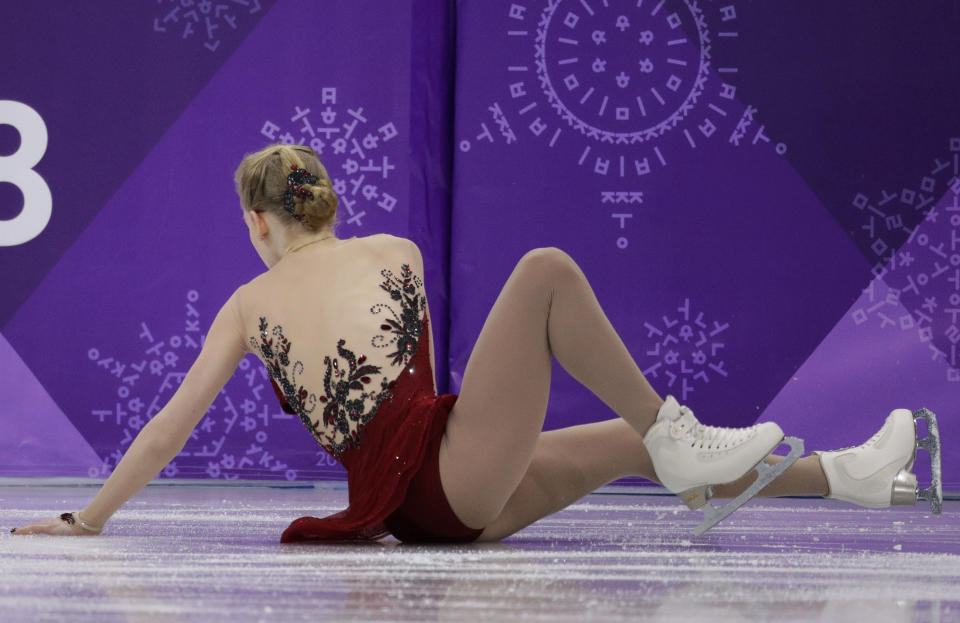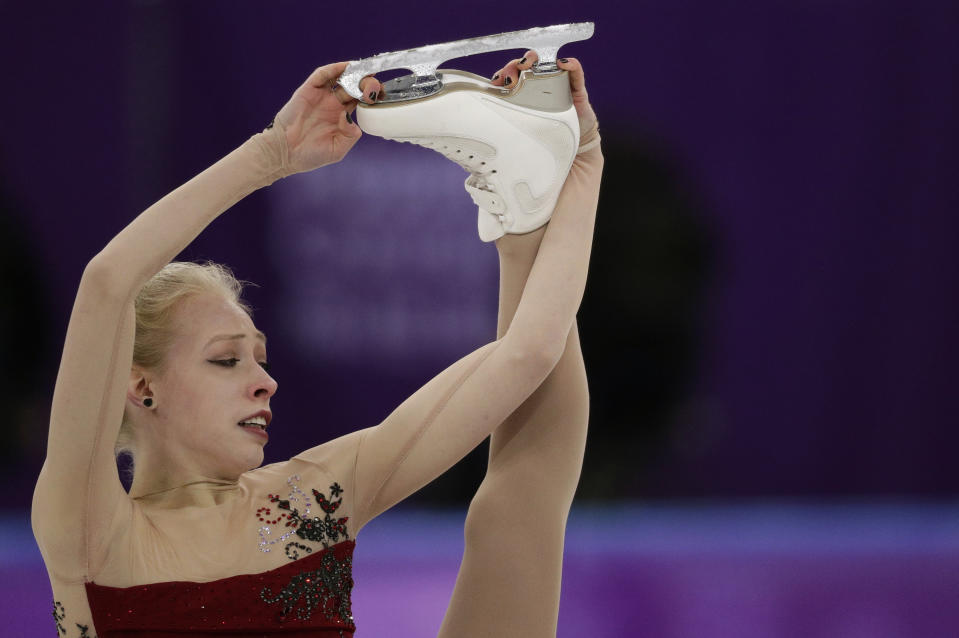A fall in the Olympics is not enough to keep Bradie Tennell down
GANGNEUNG, South Korea — Bradie Tennell doesn’t fall. That’s her thing. Triple Lutz, triple toe, triple loop – it doesn’t matter. Bradie Tennell jumps, Bradie Tennell lands on her blades. The reason Bradie Tennell won the national championship this year and punched her ticket here to PyeongChang is because she doesn’t fall. This is what you can count on.
Can you remember the last time you fell in competition, she was asked?
“No,” she said. “No. I can’t actually.”
She is nothing if not consistent. At competitions, she tries to wake up at the same time. She eats a bowl of corn flakes every day for breakfast. She skates to music from Cinderella because as a kid she was almost always Cinderella for Halloween. Her mother sews her hair net in place.
Before taking the ice, the 20-year-old listens to the same mix of 70s/80s rock music (seriously) she personally created, preferably concluding with Queen’s “Bohemian Rhapsody.” The original from Queen or a cover by someone else, she was asked?
“Oh no, no, no,” she said, pretending that she was insulted by the implication behind the question. You don’t listen to a knock-off version at the Olympics. “The original Queen. Nobody beats Freddie Mercury.”
This is Bradie Tennell, the shy kid, the oldest of three raised by a single mother, Jeannie, who poured her life into her daughter’s skating career, working two jobs as a nurse. “Actually, it might be three,” Bradie said. “I’m not sure. I call her Wonder Woman. To me, she is literally a super hero.”

If this is what her family will sacrifice, then Bradie Tennell will respond with the ability to land jumps. She isn’t the most graceful skater. She isn’t the most fluid. None of this is surprising. Bradie is not a natural athlete. When she first began to walk, she kept tripping and falling. She was put in orthotics at 11 months old to correct a pronation problem with her foot.
She somehow got into figure skating as a kid but couldn’t jump. Jeannie bought a jump rope to help with her daughter’s coordination. For a long time, she was a mess at that. As she entered competitions, she’d never take gold. This was no prodigy. Her mom taught her the importance of congratulating the winners.
She just loved to skate. So, she skated. Even after she fractured her vertebrae and spent two different three-month stints in a back brace. It held back her development but not her will. It’s possible no one else ever thought Bradie Tennell would reach the Olympics … other than the Tennells.
She never even reached international competition until 2016. The 2018 Winter Olympics is just her fifth international event, ever. Essentially, no one ever heard of her until she won the national title last month. Her spot here was supposed to be veteran Ashley Wagner’s. Bradie won, though.
She is quiet of voice and economical with her words. She could be counted on. She never fell. When U.S. Figure Skating selected who would compete in the team skate, Tennell was selected over the more accomplished and experienced Karen Chen, in part because they absolutely knew what they were going to get. And they got it. She was clean, crisp and helped the United States win bronze.
There are 30 skaters here. To determine start times, they are divided in half, via world rankings calculated by performances over the last three years. The top 15 skaters are in the second group – including Chen and fellow American Maia Nagasu. The nobodies are in the first. Tennell, because she has barely skated outside the US, was in the first group. Then a blind draw determined which of those 15 spots. She got the shortest of the sticks, first skater of the ladies’ individual program.
“Nobody likes to be the first one out there,” she said.
She began at 10:08 a.m. here, in a mostly empty Gangneung Ice Arena, people still shuffling in, wiping sleep from their eyes, sipping coffee at the start of a competition that would last over four and a half hours. Generally, no one skating at 10 a.m. has any shot at a medal. Upstarts such as Bradie are rare. There’s no reason to get here early.
The entire place was lacking energy and emotion, which can feed ice skaters like oxygen. Then there’s the fact judges tend to increase scores throughout the day, a natural one-upping of each other, which certainly doesn’t help a skater that lacks artistry.
“Just another challenge you have to go through,” she said with a shrug.
She went out there like always, calm and poised. She would do what she could, which is land those jumps like always. She is the one rare steady line in a sport built on nerves and chaos that holds to a simple, and always true, axiom.
Ice is slippery.

And that’s when the ice got slippery for Bradie Tennell.
She went into her first combo, a triple Lutz, triple toe loop. It felt wrong from the start.
“My timing was just a little off and my left arm got a little away from me,” she said.
She landed it but now needed to spring back up for another leap.
“I wasn’t able to get the snap for the second triple.”
She under rotated, lost balance and hit the ice. Bradie Tennell, the skater that doesn’t fall, fell. Not one minute into the ladies’ free skate competition her medal dreams were essentially over.
“Things happen,” she said. “We’re all human. We make mistakes.”
She did what she always did, when she couldn’t walk straight as a kid, when she was put in a brace as a teen, when she rose from a working family in a sport that requires money, when she was an unknown on the international stage, just a nobody out of the Chicago suburbs with a super hero mom believing in her.
She got up and kept going.
“You just have to,” she said.
She did a triple loop. She landed it. She did a double axel. She landed it. Of course, she did.
When she finished she stood in the middle of the Olympic arena, in the middle of the Olympic ice, in the middle of this improbable Olympic run and stared up at some Olympic rings printed on a banner in the rafters.
Up in the still mostly empty stands, her mom cheered as loud as always.
More Olympic coverage from Yahoo Sports:
• South Korean skaters leave teammate in tears
• Worst Olympian? No, Liz Swaney might be the best
• Vonn: I’ll need ‘medical miracle’ for 2022 Games
• Photo shows Gus Kenworthy’s ugly hip injury
• The legend of Chloe Kim continues to grow


